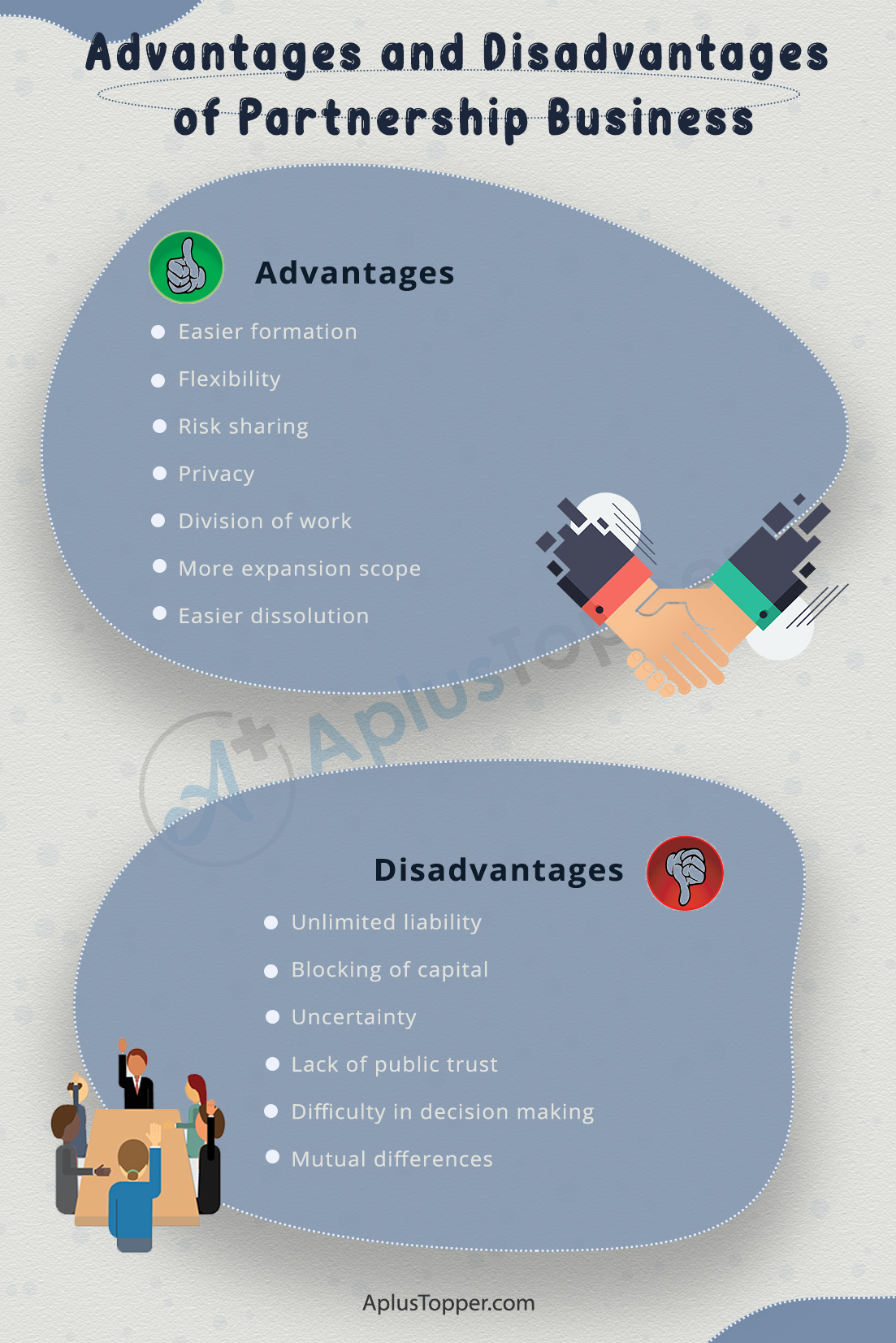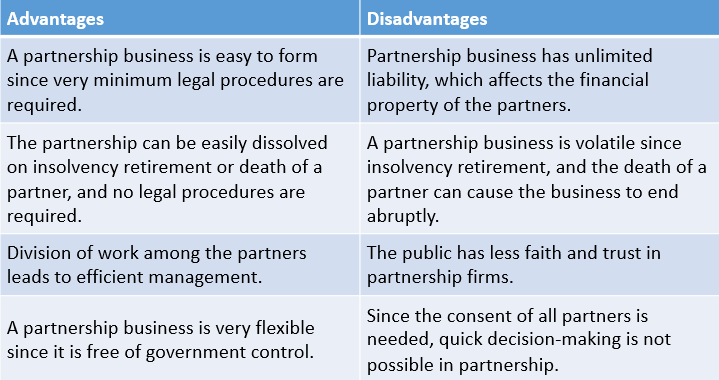Advantages and Disadvantages of Partnership: A Partnership is a formal agreement that takes place between two or more people or businesses. The firms or people signing the contract agree to become the co-owners of the company. They decide to share the business’s responsibilities and share the profits and losses generated from the business. The Indian Partnership Act of 1932 directs all the features and aspects of the partnership.
Students can also find more Advantages and Disadvantages articles on events, persons, sports, technology, and many more.
What is Partnership? Advantages and Disadvantages of Partnership 2021
A partnership business allows you to start a business with someone else without certain formalities required for starting other businesses. On the other hand, because it has fewer legal formalities, the public may have less faith in the business, resulting in the business’s downfall.
So, being aware of the advantages and disadvantages of a partnership business before starting the business is very important. This article contains the advantages and disadvantages of the partnership business for a better understanding and detailed analysis.
- Advantages of Partnership
- Disadvantages of Partnership
- Comparison Table for Advantages and Disadvantages of Partnership.
- FAQs on the Pros and Cons of Partnership
Advantages of Partnership
The partnership offers a lot of advantages, and some of the main benefits are discussed below:
- Easier formation: It is straightforward to form a partnership business. It requires fewer legal formalities, and the cost is also low. The registration of the firm is also not required to create a partnership business. Only the partners should have an agreement between them.
- Flexibility: A partnership firm has minimum legal formalities and is also free from government control. Hence, the partners can make changes in the firm according to their preferences. They can make changes in the size of the capital, the size of the business, and the management structure without any excess legal procedures. When it is necessary, the partners can make decisions in the firm based on the external environment changes.
- Risk sharing: A partnership firm usually has a lot of members. Since the members agree to share profits and losses equally, the risk is also shared by all the members. As a result, compared to a sole proprietor, the burden of risk on each partner is much lower. Due to less load, the partners are motivated to take up riskier projects with higher profit margins.
- Privacy: It is not required for a partnership firm to publish its accounts. As a result, the affairs taking place in the business remain within the business. Also, the partners are the ones who carry out the significant decisions of the business, and hence there is no chance of leakage of trade secrets, and the privacy of the firm is maintained.
- Division of work: In a partnership, all the firm’s work is divided among the partners based on their knowledge and skills. Division of labor is possible in partnership. This division of work leads to efficient management, which results in higher profits.
- More expansion scope: A partnership has a more expansive scope than a sole proprietorship business. In a partnership firm, the partners can arrange more considerable funds from their capital and their borrowings. The partners also have good managerial skills. Their organizational skills are also used for expansion and efficiency.
- Easier dissolution: The dissolution of a partnership does not require any legal procedure. Insolvency or lunacy, or the death of a partner, can result in the dissolution of the firm. Therefore, it is easy and cheap to dissolve a partnership.
Disadvantages of Partnership
- Unlimited liability: In a partnership business, the partners agree to share all the losses and profits between them. The partners are also entitled to take responsibility for all the debts, even if they are not their debts. The liability of all the partners is not limited. This is usually a burden on the personal properties and finances of the partners.
- Blocking of capital: If a partner wishes to withdraw their wealth from the firm, they can not do so alone. If the other partners agree to it, only then is withdrawal possible. The partners are also not allowed to transfer their shares to someone else. If someone wants to do so, then they must get the consent of the other partners. As a result, they lose the liquidity of their investment. This is one of the significant reasons that discourage people from investing in a partnership.
- Uncertainty: A partnership business suffers from instability. Insanity, insolvency, retirement, and the death of a partner may result in the sudden end of the business. Other than the causes mentioned above, a partner can also notice the business’s dissolution to the other partners. As a result of all these instabilities, it has become difficult to do long-range planning and innovative ideas for business.
- Lack of public trust: The public has less confidence in partnership firms since their annual reports and accounts are not published. Therefore, the public does not trust their dealings.
- Difficulty in decision making: In a partnership business, the consent of every partner is needed before making a decision. From minor to major, all decisions require the approval of all partners. The acceptance of all partners is needed for policy-making choices as well. As a result, the partners are unable to make spontaneous or quick decisions regarding the firm.
- Mutual differences: The details, records, and secrets of a partnership firm are known by all the partners. If a mutual conflict arises among the partners, there is a high chance of information leakage regarding the firm. The partners may pass the secrets of their firm to other competitors.
Advantages And Disadvantages Of Partnership Business In Tabular Form
| Advantages of Partnership Business | Disadvantages of Partnership Business |
| 1. Shared Responsibilities and Workload | 1. Unlimited Liability for Partners |
| 2. Greater Access to Capital and Resources | 2. Potential for Disagreements and Conflict |
| 3. Pooling of Complementary Skills and Expertise | 3. Lack of Centralized Decision-making Power |
| 4. Potential Tax Benefits and Flexibility | 4. Limited Life of the Partnership |
| 5. Ease of Formation and Low Start-up Costs | 5. Difficulty in Withdrawing or Adding Partners |
| 6. Opportunity for Sharing of Risk and Reward | 6. Potential for Unequal Contribution of Effort or Investment |
| 7. Flexibility in Management and Operations | 7. Difficulty in Transferring Ownership or Exiting the Partnership |
| 8. Potential for Increased Innovation and Creativity | 8. Lack of Secrecy and Confidentiality |
| 9. Enhanced Access to Markets and Customers | 9. Potential for Loss of Autonomy or Control |
| 10. Ability to Take Advantage of Specialized Knowledge and Networks | 10. Potential for Personal Conflicts or Differences to Affect Business |

Comparison Table for Advantages and Disadvantages of Partnership
| Advantages | Disadvantages |
| A partnership business is easy to form since very minimum legal procedures are required. | Partnership business has unlimited liability, which affects the financial property of the partners. |
| The partnership can be easily dissolved on insolvency retirement or death of a partner, and no legal procedures are required. | A partnership business is volatile since insolvency retirement, and the death of a partner can cause the business to end abruptly. |
| Division of work among the partners leads to efficient management. | The public has less faith and trust in partnership firms. |
| A partnership business is very flexible since it is free of government control. | Since the consent of all partners is needed, quick decision-making is not possible in partnership. |

FAQs on Pros and Cons of Partnership
Question 1.
In a partnership business, can a minor become a partner?
Answer:
Yes. A partner who has not reached the age of maturity is called a minor partner. A nominal partner can be admitted into the business, but they can only be a part of the benefits of the partnership and are not liable for any debts of the firm like the other partners.
Question 2.
Is it necessary for a partnership firm to get registered?
Answer:
It is not necessary. However, the partners’ rights against strangers in court will not be viable if the firm is unregistered with the registrar of firms and societies.
Question 3.
What is the limit on the number of partners in a partnership firm?
Answer:
The limit on the number of partners in a partnership firm is 20. In a partnership firm, there may be 20 partners, but not more than that. If there are more members, then it will become a company.
